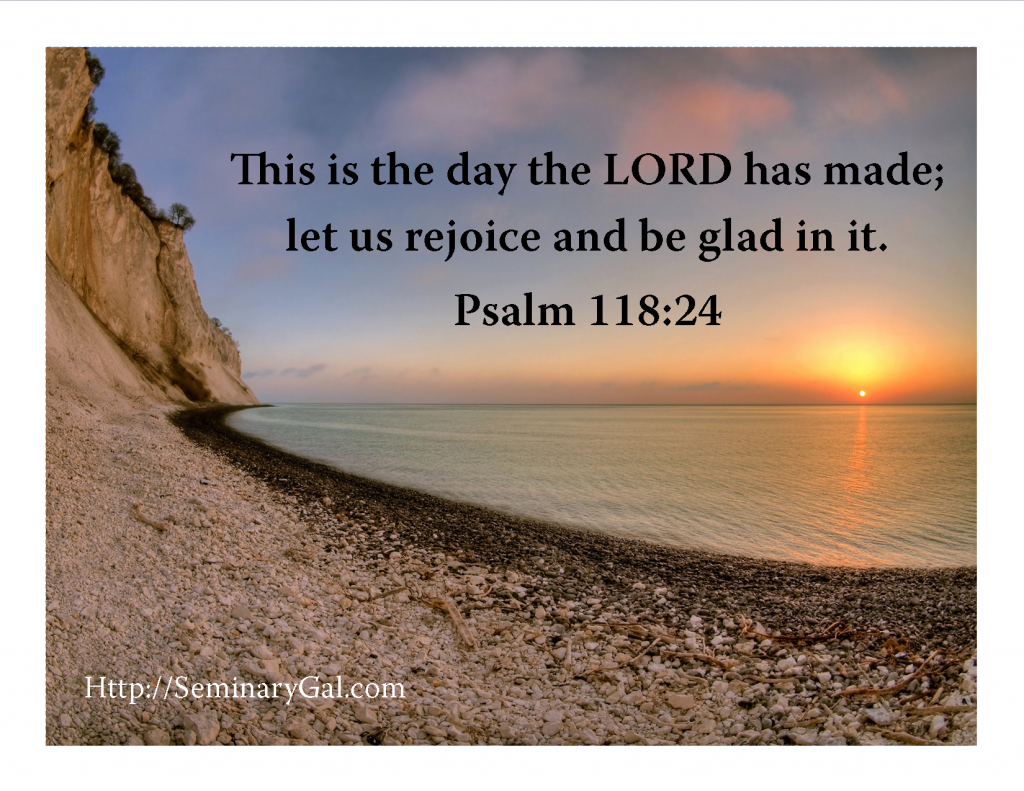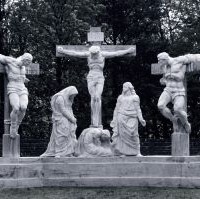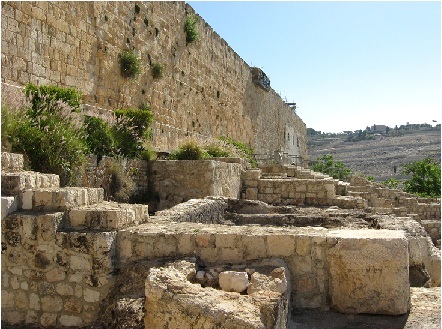Do you ever feel like the world is against you? That everything is imploding all around you and you don’t know where to turn? Maybe that familiar feeling of panic is breathing its breath right in your face?
 If you’ve been walking the Christian walk for awhile, you know what I’m talking about.
If you’ve been walking the Christian walk for awhile, you know what I’m talking about.
One hopes that the life of God’s faithful people involves blessing after blessing, but the truth is our walk of faith is filled with opposition. That’s because opposition is the soil where faith grows.
Where do you turn when opposition arises? The Bible is clear on the subject of suffering and opposition and the way in which we can stand firm. When opposition arises, we look to God with eyes of faith. There’s an interesting passage, one that I have theatrically portrayed a time or two in the role of Miriam, Moses’ sister. We have become so accustomed to the story that we give a great yawn of ho-hum, yada, yada, yada. But when it is reenacted, this story has captivated people who suddenly see themselves in a place of needing deliverance and the desperate straits of God’s people who desire to live by faith.
Read along as I interject thoughts about dealing with opposition, struggles, and suffering:
Exodus 14:9 The Egyptians– all Pharaoh’s horses and chariots, horsemen and troops– pursued the Israelites and overtook them as they camped by the sea near Pi Hahiroth, opposite Baal Zephon. 10 As Pharaoh approached, the Israelites looked up, and there were the Egyptians, marching after them. They were terrified and cried out to the LORD. 11 They said to Moses, “Was it because there were no graves in Egypt that you brought us to the desert to die? What have you done to us by bringing us out of Egypt? 12 Didn’t we say to you in Egypt, ‘Leave us alone; let us serve the Egyptians’? It would have been better for us to serve the Egyptians than to die in the desert!”
The goal of opposition is to cause us to look back, cease progress, and destroy our lives of faith. Don’t you find it interesting that they were terrified and cried out to the LORD, but then they spoke to Moses? With a horizontal outlook, they saw the tyranny of the Egyptians and the fault of Moses. All of this is a worldly perspective. When suffering comes your way, don’t look around. Look up. That’s what Moses did.
Exodus 14:13 Moses answered the people, “Do not be afraid. Stand firm and you will see the deliverance the LORD will bring you today. The Egyptians you see today you will never see again. 14 The LORD will fight for you; you need only to be still.”
Moses was trying to get the Israelites to look to God. Look up, he exhorts them! But he had one eye up and one eye on the same Egyptian pursuers they saw. Sometimes all the faith we can muster is one eye up and speaking words of faith to try to pull the other eye up off our circumstances.
Have you ever had double vision in that way? Trying to see with eyes of faith but finding yourself unable to keep your eyes off the pain of your present situation? I’m not one to be too hard on Moses. It is by God’s design that the deliverance and faith required was more than one man could accomplish.
Exodus 14:15 Then the LORD said to Moses, “Why are you crying out to me? Tell the Israelites to move on. 16 Raise your staff and stretch out your hand over the sea to divide the water so that the Israelites can go through the sea on dry ground. 17 I will harden the hearts of the Egyptians so that they will go in after them. And I will gain glory through Pharaoh and all his army, through his chariots and his horsemen. 18 The Egyptians will know that I am the LORD when I gain glory through Pharaoh, his chariots and his horsemen.”
The LORD said to Moses, “Why are you [Moses] crying out to me?” It’s like Moses had been crying out, “I do believe; help me overcome my unbelief!” (Mark 9:24).
 God takes our mustard seeds of faith, plants them in the soil of opposition, and multiplies our faith.
God takes our mustard seeds of faith, plants them in the soil of opposition, and multiplies our faith.
He gives Moses a plan and a process through which God will work. When we exercise all the faith we have and endeavor to look up, God multiplies the faith we have.
God did not say that He was going to part the waters from heaven when Moses cried out. Moses would raise his staff and stretch his hand and the LORD’s command to Moses was “divide the water.” A command no different than raise your staff, stretch out your hand. Moses’ faith had been multiplied. He took God at His word. Moses didn’t stop and say,
That doesn’t make any sense. I’ve never divided water before in my life.”
He just believed God would do it. Moses was an amazing man of faith, but this is the same way in which God wants each of us to go through our days. Believe. Look to God with eyes of faith. Trust that your deliverance will be accomplished. Plant your seeds of faith in the soil of opposition and God will make faith grow.
Exodus 14:19 Then the angel of God, who had been traveling in front of Israel’s army, withdrew and went behind them. The pillar of cloud also moved from in front and stood behind them, 20 coming between the armies of Egypt and Israel. Throughout the night the cloud brought darkness to the one side and light to the other side; so neither went near the other all night long.
I wonder how Moses would have felt, seeing the angel of God and the pillar of cloud moving from in front to standing in the gap behind them. Would it have inspired fear that no one was in front of them? They were alone, facing the sea! Would Moses have to overcome the fear of what lay ahead knowing that God was not walking before them? Or would it have reassured him that God was giving evidence to increase Moses’ faith by standing in the gap Himself? I don’t pretend to know. But I do see the outcome:
Exodus 14:21 Then Moses stretched out his hand over the sea, and all that night the LORD drove the sea back with a strong east wind and turned it into dry land. The waters were divided, 22 and the Israelites went through the sea on dry ground, with a wall of water on their right and on their left.
God wasn’t going to make Moses part the sea, to truly do the humanly impossible. Moses divided the sea by faith. God divided it by divine power. Even so, the attackers pressed on into the place that LORD made when faith acted.
Exodus 14:23 The Egyptians pursued them, and all Pharaoh’s horses and chariots and horsemen followed them into the sea. 24 During the last watch of the night the LORD looked down from the pillar of fire and cloud at the Egyptian army and threw it into confusion. 25 He made the wheels of their chariots come off so that they had difficulty driving. And the Egyptians said, “Let’s get away from the Israelites! The LORD is fighting for them against Egypt.”
Isn’t it interesting that the Egyptian oppressors, faithless opportunists, pushed in to gain even after the Israelites moved in faith? If you have ever experienced spiritual opposition, you know (as I do) that the attack can often seem worse the more faith you exercise until that moment when God brings you to that line where the faithless cannot go. Maybe you feel like “It’s always darkest before the dawn.”
 But a point comes when your faith bears fruit and you take that step into an area where the faithless cannot tread. The spiritual opposition stops in its tracks, confused, unable to move forward.
But a point comes when your faith bears fruit and you take that step into an area where the faithless cannot tread. The spiritual opposition stops in its tracks, confused, unable to move forward.
Exodus 14:26 Then the LORD said to Moses, “Stretch out your hand over the sea so that the waters may flow back over the Egyptians and their chariots and horsemen.” 27 Moses stretched out his hand over the sea, and at daybreak the sea went back to its place. The Egyptians were fleeing toward it, and the LORD swept them into the sea. 28 The water flowed back and covered the chariots and horsemen– the entire army of Pharaoh that had followed the Israelites into the sea. Not one of them survived. 29 But the Israelites went through the sea on dry ground, with a wall of water on their right and on their left.
Deliverance from difficult times happens when our faith bears fruit. The opposition—that once sought to keep us from taking an imperative step of faith—gives up, having lost the battle to have you turn back. To fall away. To say, it’s just not worth it.
Exodus 14:30 That day the LORD saved Israel from the hands of the Egyptians, and Israel saw the Egyptians lying dead on the shore. 31 And when the Israelites saw the great power the LORD displayed against the Egyptians, the people feared the LORD and put their trust in him and in Moses his servant.
Faith’s fruit contains seed that when sown, produces offspring like it. Faith grows more faith.
Sometimes, you may hear people say things like, “New level, new devil.”
While I’m not sure whether there’s a new devil or just the same old one that tries new and more drastic measures, I have great confidence that faith in God grows more faith in God.
And this faith grows best in the soil of opposition.
1 Peter 4:12 Dear friends, do not be surprised at the painful trial you are suffering, as though something strange were happening to you. 13 But rejoice that you participate in the sufferings of Christ, so that you may be overjoyed when his glory is revealed. 14 If you are insulted because of the name of Christ, you are blessed, for the Spirit of glory and of God rests on you.














